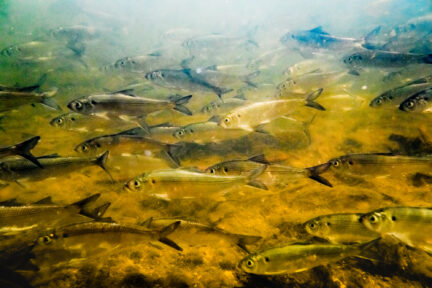Bay Program Partners welcome new climate change coordinator
Today, the Chesapeake Bay Program welcomes it’s first-ever Climate Change Coordinator, a position managed by National Oceanic and Atmospheric Administration’s (NOAA) Chesapeake Bay Office. Zoe Johnson will lead efforts to develop climate change policies in support of the goals of the Chesapeake Bay Watershed Agreement, helping partners work together to increase the resiliency of the Bay watershed in the face of the adverse effects of changing environmental conditions.
“Climate change is already having a dramatic impact on the Chesapeake Bay and its watershed. Zoe Johnson has an incredible amount of experience at both the state and national level formulating climate adaptation and resiliency policies as well as management strategies for addressing these impacts,” said Nick DiPasquale, Bay Program Director. “We are extremely fortunate to have her leading this effort for the partnership.”
In addition to assessing the vulnerability of living resources and habitats to a changing climate, Johnson will be working closely with the Bay Program’s partners who are currently engaged in ecosystem restoration and conservation efforts, serving as the Climate Change Liaison and facilitating meetings of the Bay Program’s Climate Action Team. She brings a wealth of experience working with these issues in the Bay region, having served as the Director of Climate Change planning and Policy at the Maryland Department of Natural Resource since 2008.
“NOAA is a leader in climate science, and we are excited to add Zoe's exceptional expertise to the team. Zoe will play a key role in leading climate resiliency outcomes for the Chesapeake Bay watershed,” said Peyton Robertson, NOAA Chesapeake Bay Office Director.
As one of the most vulnerable regions in the nation, the Chesapeake Bay is expected to experience major shifts in environmental conditions in the future. All aspects of life in the Bay watershed—from living resources to public health, from habitat to infrastructure—are at risk from the effects of a changing climate. Understanding and adjusting our work based on evolving conditions, through effective programs and adaptive policies, can help build the resiliency of the region’s living resources, habitats and communities.
In June 2014, representatives from across the region signed the Chesapeake Bay Watershed Agreement, with the vision of fostering an environmentally and economically sustainable watershed with clean water, abundant life, conserved lands and access to the water, a vibrant cultural heritage, and a diversity of engaged citizens and stakeholders. Signatories include the governors of Delaware, Maryland, New York, Pennsylvania, Virginia and West Virginia; the mayor of the District of Columbia; the chair of the Chesapeake Bay Commission; and the administrator of the U.S. Environmental Protection Agency (EPA) on behalf of the Federal Leadership Committee for the Chesapeake Bay. This agreement marked the first time climate resiliency was included in the partnership’s guiding principles.



